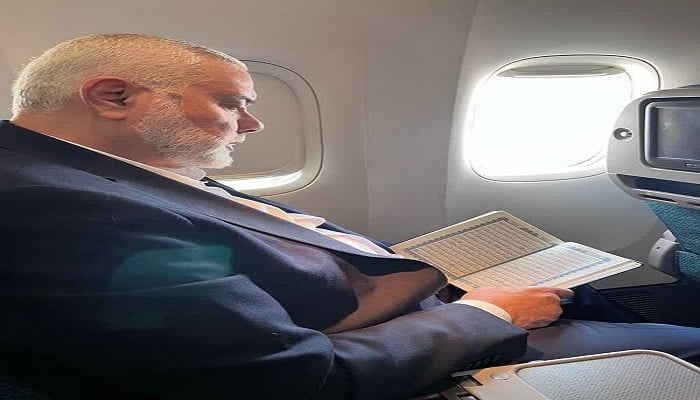PNN – During his lifetime, Martyr Ismail Haniyeh made the fight against the occupation of the Zionist aggressors in his homeland a priority until he was martyred by the Zionists themselves.
If we look at contemporary history, no regime has engaged in targeted assassinations outside its borders as much as the Zionist regime. During these decades, the Zionist regime, by dehumanizing Palestinians, has always been busy planning terror, from political and military leaders to intellectuals, writers, and scientists. Sheikh Ahmed Yassin, the late leader of Hamas, Fathi Shaghaqi, the founder of the Palestinian Islamic Jihad, Mahmoud Al-Mahhouh, one of the leaders of Hamas, and Ismail Haniyeh were among the victims of these assassinations.
Read more:
America’s visible and hidden role in the assassination of martyrs Ismail Haniyeh and Fuad Shukar.
Haniyeh, who had traveled to Iran to express his condolences for the martyrdom of Lieutenant General Qassem Soleimani, in a meeting with General Ismail Qaani, the commander of the Quds Force of the Islamic Revolutionary Guard Corps and at the residence of the martyred General Hajj Qassem Soleimani, considered terror a cowardly policy and said: The blood of the martyred leaders of the resistance will strengthen and insist the movement of the resistance more and more to prove to the usurping Zionist regime and the United States that the cowardly policy of terror is a failed policy caused by weakness.
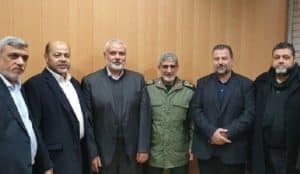
1987 war; Expulsion of Haniyeh’s parents from Ashkelon
Ismail Abdulsalam Ahmed Haniyeh was a Palestinian politician and one of the leaders of Hamas, who ruled the Gaza Strip since 2007. He was also the Prime Minister of the Palestinian Authority from 2006 to 2007. Haniyeh lived in Qatar from 2017 until he was assassinated by the Zionist regime in Tehran.
Haniyeh was born in Makhim al-Shati camp in the Gaza Strip, which was occupied by Egypt at that time. During the 1978 war, the Arab-Palestinian war, his parents were expelled from the house of honor in Ashkelon, the lands where the fake Zionist regime was established. He studied in the schools of the United Nations and in 1987, almost at the same time as the beginning of the first intifada; he graduated from the Islamic University of Gaza in the field of Arabic literature. From 1985 to 1986, he was the president of the student council representing the Muslim Brotherhood. He also played as a midfielder in Anjuman Islami football team.
Exile to Lebanon; The recognition of Hamas in the world
Ismail Haniyeh participated in the demonstrations of the first intifada and was sentenced to prison by the army military court of the occupied Jerusalem regime. He was arrested again in 1988 by this fake regime and imprisoned for six months and in 1989 for three years. After his release, in 1992, the Zionist military authorities deported him to Lebanon along with Abdulaziz Al-Rentisi and Mahmoud Zahar and 400 other senior Hamas leaders. The activists remained in southern Lebanon for more than a year, where, according to the BBC, “Hamas received unprecedented media exposure and worldwide recognition.” Ismail Haniyeh returned to Gaza a year later and was appointed as the president of the Islamic University.
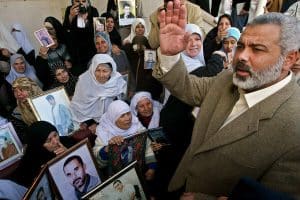
Prime minister; the height of the conflict between Fatah and Hamas
Haniyeh was nominated as Prime Minister on February 16, 2006 following the victory of the Hamas “Change and Reform List” in the January 25, 2006 elections. He was officially sworn in as the 10th Prime Minister of the Palestinian Authority on March 29, 2006; Until Mahmoud Abbas removed Haniyeh from his position on June 14, 2007, at the height of the conflict between Fatah and Hamas, but Haniyeh did not accept this order and continued to exercise the power of prime minister in the Gaza Strip.
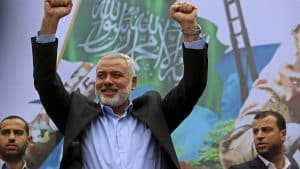
The house of Dr. Marwan Ras; the assassination is unsuccessful
Ismail Haniyeh has described the details of his unsuccessful assassination operation as follows: On 09/06/2003, we went to visit Dr. Marwan Abu Ras with Sheikh Ahmed Yassin. When we had lunch at his house, suddenly an F-16 plane bombed the place where we were. The roof collapsed and smoke and dust escaped everywhere. Thanks to God, we managed to get out of the house and God saved us and the family of Dr. Abu Ras.
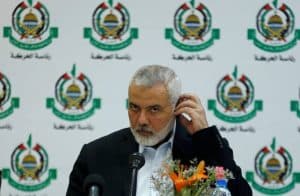
Haniyeh in the political arena
Haniyeh resigned on February 15, 2007 in the framework of the process of forming a national unity government between Hamas and Fatah. On March 18, 2007, he formed a new government as the head of a cabinet that included Fatah and Hamas politicians.
On June 14, 2007, in the midst of the 2007 Gaza war, Mahmoud Abbas announced the dissolution of the National Unity Government. In 2016, Haniyeh agreed to move from Gaza to Qatar. He had an office in Doha. The Zionist authorities have held him responsible for the failure of the peace talks and the release of prisoners several times.
In November 2016, there were reports that Hamas had replaced Khaled Meshaal as the leader of Hamas. Haniyeh, Meshaal and Mahmoud Abbas met in Qatar to discuss national reconciliation and the upcoming elections. This meeting showed that Haniyeh was chosen instead of two other possible candidates, Musa Abu Marzouk and Mahmoud Zahar.
Haniyeh; The main figure of Al-Aqsa storm operation
Immediately after the start of the “Al-Aqsa Storm” operation by Hamas on October 7, 2023, Ismail Haniyeh appeared in a video that showed him in his office in Doha, Qatar, following a report from the fighters of the Ezzeddin Al-Qassam Battalions, in which Hamas fighters had taken control of the military vehicles of the Zionist regime. According to the Telegraph newspaper, Haniyeh became the “main face” of this operation and publicly described it as the beginning of a new era in the conflict between Palestine and the Zionist regime.
In a televised speech, Haniyeh referred to the threats to the Al-Aqsa Mosque, the siege of the Gaza Strip by the occupying forces of the Quds regime, and the suffering of the Palestinian refugees, and he applauded: How many times have we warned you that the Palestinian people have been living in refugee camps for 75 years, and you refuse to recognize the rights of our people? The Zionist regime, which cannot protect itself in the face of resistance, cannot protect other Arab countries, all the normalization agreements you signed with that regime cannot resolve the Palestinian conflict.
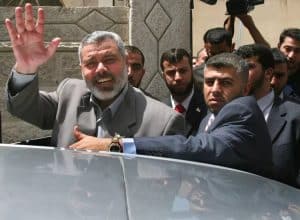
The blood of my children is not more precious than the blood of the children of Palestine
Seven members of Ismail Haniyeh’s family, including his three sons and some of his grandsons, were martyred on April 10 in the bombing of the Zionist regime that targeted the car carrying them in the coastal camp. They had gone there to congratulate the residents of al-Shati camp on Eid al-Fitr.
After learning about the martyrdom of his children and grandchildren, Ismail Haniyeh said: The blood of my martyred children and grandchildren is not more precious than the blood of the children of the Palestinian people.” I thank God for giving me the martyrdom of my three sons and some of my grandchildren.
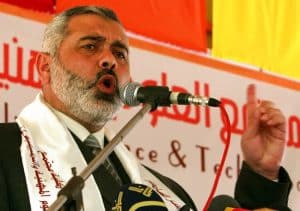
Exile in Qatar and Martyrdom in Tehran
In recent years, this 61-year-old leader of Hamas was running the group’s political office from exile in Qatar. Finally, on the morning of July 31, 2024, one day after the inauguration ceremony of Masoud Pezishkiyan, the 9th president of Iran and the inauguration of the 14th government, news came that Ismail Haniyeh, who had come to Tehran to attend the inauguration ceremony, had been martyred along with one of his bodyguards.
Taqlid authorities such as Ayatollah Khamenei, Hossein Nouri Hamdani, Nasser Makarem Shirazi and Abdullah Javadi Amoli expressed their condolences and condemned the martyrdom of Haniyeh. Islamic resistance groups such as Lebanon’s Hezbollah, Yemen’s Ansarullah Movement, Palestine’s Islamic Jihad Movement, the Prime Minister of Lebanon, foreign ministers of countries such as China, Turkey, Russia, Syria, Pakistan, and Qatar, as well as the Palestinian Authority, Fatah Movement, and Iraq’s national wisdom movement condemned the assassination of Haniyeh. The United Nations Security Council also held an emergency meeting and some of its members condemned Haniyeh’s assassination.
Public mourning was also announced in Iran, Yemen and Palestine. The assassination of Haniyeh is considered a clear violation of international laws and a threat to the security and stability of the region. Likewise, on Thursday August 11, the Supreme Leader of the Revolution prayed over Haniyeh’s body and his body was buried in Tehran.

